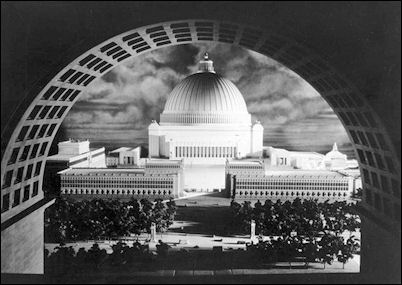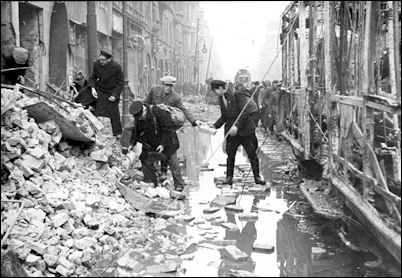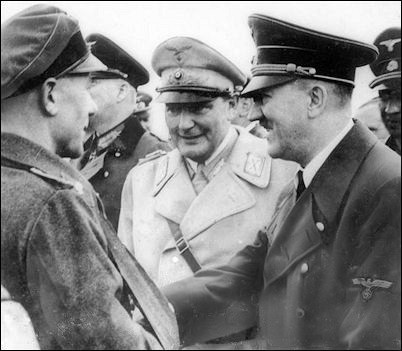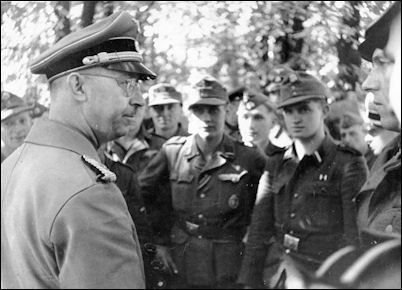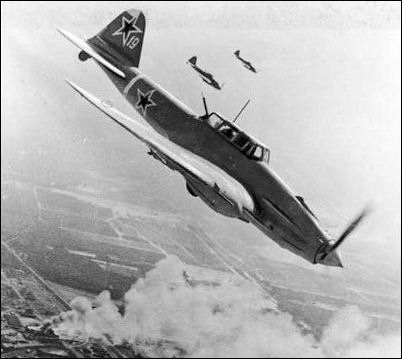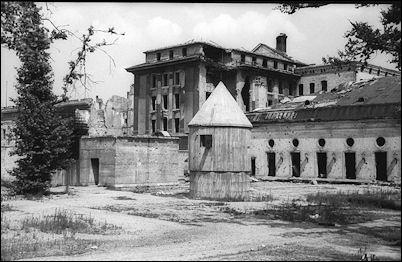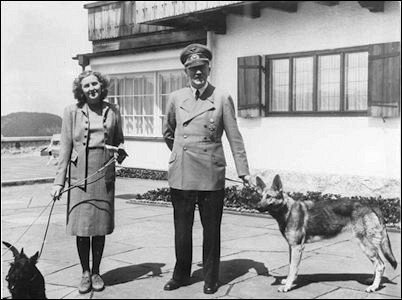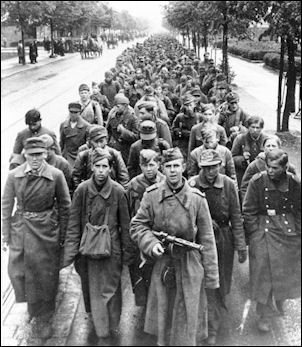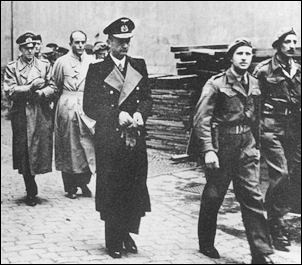![]()

Downfall of Adolf Hitler
All of his life, Adolf Hitler had been obsessed with the musical works of German composer Richard Wagner. As a teenager living in Austria, Hitler was deeply inspired by Wagner's operas and their pagan, mythical tales of struggles against hated enemies. One time, back in 1905, after seeing Wagner's opera Rienzi, young Hitler professed he would someday embark on a great mission, leading his people to freedom, similar to the opera's story.
Now, some 40 years later, after failing in his mission as Führer of the German People and Reich, another of Wagner's operas hearkened, and it was Hitler's favorite – Der Ring des Nibelungen. It concerns a magic Ring granting its possessor the power to rule the world. In the last part of this opera, entitled Götterdämmerung, or 'Twilight of the gods," the hero Siegfried, betrayed by those around him, loses the Ring and winds up on a funeral pyre while the fortress of Valhalla burns and the kingdom of the gods is destroyed.
This essentially was the ending Hitler inflicted upon himself, his People and his Reich.
Piece by piece, it all came together over the last ten days of his life, beginning on Friday, April 20, 1945. That day Hitler met for the last time with his top Nazis. The occasion was Hitler's 56th birthday, a dreary celebration inside the Führerbunker in Berlin. Present were Joseph Goebbels, Hermann Göring, Heinrich Himmler, Joachim Ribbentrop, Albert Speer and Martin Bormann, along with military leaders Wilhelm Keitel, Alfred Jodl, Karl Dönitz, and Hans Krebs, the new Chief of the General Staff.
At first, those present tried to convince the Führer to leave doomed Berlin for the relative safety of Berchtesgaden, the mountain area along the German-Austrian border where he had his villa. From there he could continue the fight, supported by troops positioned throughout the impenetrable Alpine mountains of western Austria and southern Bavaria. Such a move might prolong the war indefinitely and improve the odds of a favorable outcome for Germany, one way or another.
But Hitler brushed aside this suggestion, knowing that any journey outside the bunker brought great risk of capture. And above all, the Führer did not want himself, alive or dead, to wind up prominently displayed by his enemies, particularly the Russians. However, he did give his bunker personnel permission to leave. Most of his staff therefore departed for Berchtesgaden via a convoy of trucks and planes, still hoping the Führer would follow. Only a handful of Hitler's personal staff remained with him, including his top aide Martin Bormann, a few SS and military aides, two private secretaries, and his longtime companion, Eva Braun.
Hitler's choice to remain in the Führerbunker to the very end amounted to his final decision of the war. It was made known to the German people via a special radio announcement in the hope that his presence in the Nazi capital would inspire all remaining Wehrmacht, SS, Volkssturm and Hitler Youth units in Berlin to hold out to the end as well.
Although the war was lost, Hitler nevertheless took pride in the knowledge that he had not allowed another repeat of November 1918, when the German Army had meekly asked the Allies for armistice terms to conclude the First World War. This was all Hitler had left. Just a few years earlier, the Führer had been regarded by most German's as their greatest-ever military leader. Now, all that remained of his military legacy was the fact he had refused to give up no matter what.
The Führer's stubborn pride insured that thousands of German soldiers, Hitler Youths and civilians would needlessly lose their lives in the streets of Berlin, where advance units of the Red Army were already probing. Inside the bunker, Hitler told General Jodl, "I will fight as long as I have a single soldier. When the last soldier deserts me. I will shoot myself."
However, the Führer's fatalism was not shared by his two oldest comrades, Hermann Göring and Heinrich Himmler, who had both scooted away from Berlin just hours after Hitler's birthday gathering. Göring made it safely to Berchtesgaden where he had his own villa, bringing along truckloads of artworks looted from museums all over occupied Europe. For his part, Himmler headed in the opposite direction, staying for the moment in a small town northwest of Berlin.
Both men were spurred to act on their own in the aftermath of the Führer's shocking behavior during the military conference held in the bunker on Sunday, April 22nd. To everyone there that day, it seemed the Führer had suffered a total mental and physical breakdown, completely losing control while letting loose a shrieking denunciation of the Army, then collapsing into a chair. News of the Führer's appalling condition spread like wildfire among the top Nazis outside Berlin, including Göring and Himmler.
Göring, the Führer's designated successor, now pondered whether or not to announce he was the new leader of the Reich, since Hitler was presently cut off from the rest of Germany in besieged Berlin, and apparently incapacitated. But the inherent danger of such a move, even at this late stage, gave him pause for concern. And so Göring put off a decision and instead sent Hitler a carefully worded telegram the next day, Monday, April 23rd, trying to feel him out:
"My Führer! In view of your decision to remain in the fortress of Berlin, do you agree that I take over at once the total leadership of the Reich, with full freedom of action at home and abroad as your deputy, in accordance with your decree of June 29, 1941? If no reply is received by 10 o'clock tonight, I shall take it for granted that you have lost your freedom of action, and shall consider the conditions of your decree as fulfilled, and shall act for the best interests of our country and our people..."
Göring didn't know that Hitler had since rebounded from his meltdown and regained a measure of composure. Therefore, Hitler's response to Göring's telegram, prompted by Martin Bormann, was that the Reich Marshal had committed "high treason." Although this carried the death penalty, Göring would be spared if he immediately resigned all of his titles and offices – which Göring promptly did. Next, Bormann, a longtime behind-the-scenes foe of Göring, transmitted an order to the SS near Berchtesgaden to arrest Göring and his staff. As a result, just before dawn on Tuesday, April 24, Göring was put under house arrest. Thus ended the long career of the man who would be Führer.
In contrast to Göring's cautiousness, Himmler took a much bolder approach. At the very moment that Hitler was reading Göring's telegram, Himmler was secretly proposing the surrender all German troops in the West to General Eisenhower.
Himmler had traveled to the city of Lübeck in northern Germany to meet with Count Folke Bernadotte of the Swedish Red Cross. Himmler's idea was to have Bernadotte contact Eisenhower regarding the surrender in the West, while at the same time Germany would continue fighting the Russians in the East, soon to be joined by the Americans and British. Playing a key role in this new German-American-British alliance would be the leader of post-Hitler Germany, Heinrich Himmler himself.
His proposal got nowhere. By now, Himmler's name, and that of the SS organization he headed, was already synonymous with mass murder.
Meanwhile, the military situation continued to deteriorate. On Wednesday, April 25th, Russian and American soldiers greeted each other face-to-face at Torgau on the Elbe River, seventy-five miles south of Berlin, effectively severing Nazi Germany in two. The next day, Russian artillery fire made the first direct hits upon the Reich Chancellery buildings in Berlin and the grounds directly above the Führerbunker.
A German tank officer described the scene in his diary: “We retreat again under heavy Russian air attacks. Inscriptions [I see] on house walls [say]: ‘The hour before sunrise is darkest’ and ‘We retreat but we are winning.’…The night is fiery red. Heavy shelling. Otherwise a terrible silence…Women and children huddling in niches and corners and listening for the sounds of battle…Nervous breakdowns.”
By Friday, April 27, Russian bombardment of the Reich Chancellery buildings had reached its peak with numerous direct hits, causing Hitler to send frantic telegrams to Field Marshal Keitel demanding that Berlin be relieved by now non-existent armies.
For Hitler, the worst blow of all came the next day when BBC news radio reports concerning Himmler's surrender negotiations were broadcast from London and picked up by Goebbels' Propaganda Ministry. According to eyewitnesses in the bunker, Hitler "raged like a madman" with a ferocity never seen before when informed of the betrayal. Himmler had been at his side since the beginning, earning the fond nickname Der Treue Heinrich (Faithful Heinrich) through years of murderous, fanatical service to his Führer. Now, Hitler wanted to have him shot.
Since Himmler was nowhere to be found, Hitler ordered his personal liaison in the bunker, SS-General Hermann Fegelein, shot instead. Fegelein was already under suspicion, having been nabbed the day before trying to sneak out of Berlin in civilian clothing. After some brief questioning, he was taken up to the Chancellery garden above the bunker and summarily executed.
In the meantime, advance units of the Red Army had smashed through the German defenses in Berlin and were only a few miles away from the bunker. Hitler was informed there was perhaps a day or two left before the Russians arrived at his doorstep.
Now, at long last, Hitler reconciled himself to defeat, and began preparations for his own death.
First, he married Eva Braun, as a reward for her ceaseless devotion, during a relationship in which she had spent nearly all of her time at Berchtesgaden waiting for him to show up. They were married in a brief ceremony about an hour past midnight, early Sunday, April 29, with Goebbels and Bormann in attendance. Everyone was then invited into the Führer's private quarters for a wedding breakfast featuring champagne and fond reminisces by Hitler of better days gone by, followed by a bitter accounting of the recent betrayal by his two oldest comrades. Those who listened were moved to tears. Shortly thereafter, Hitler excused himself, bringing along his staff secretary, Traudl Junge, to whom he dictated his last will along with a two-part political testament.
In his will he left his possessions to the Nazi Party and also revealed his fate: "I myself and my wife – in order to escape the disgrace of deposition or capitulation – choose death. It is our wish to be burnt immediately on the spot where I have carried out the greatest part of my daily work in the course of twelve years' of service to my people."
His political testament recited familiar themes first stated in his book Mein Kampf back in 1925. In addition, he blamed the Jews for everything, including the war. He cited the extermination threat he had made on January 30, 1939, followed by a veiled reference to the gas chambers, labeling them a “humane means” of making the Jews atone for the guilt of causing the war.
In the second part of his political testament, he expelled both Göring and Himmler from the Nazi Party and appointed Admiral Karl Dönitz as his successor, not as Führer, but as President of the Reich. Dönitz was to preside over a government with Goebbels as Chancellor and Bormann as Party Minister. After completing his dictations, Hitler went off to bed, having been up all night.
While the Führer slept, the Battle of Berlin raged in the streets above him, with the Germans fighting fanatically to defend every inch, just as Hitler hoped they would. Above all, they tried to knock out the Russian T34 tanks now rolling toward Hitler. A Russian tank driver recalled: "There were a lot of Panzerfausts [anti-tank grenade launchers] in Berlin. They were lying in every basement. Mostly the operators were old men or boys."
Casualties on both sides were high. But the Russians pressed forward relentlessly, blasting through anything in their way. The Red Army under Marshal Zhukov, after a journey of some 1500 miles that had begun back in Stalingrad, was now close to victory. When the Führer awoke about noontime, he was told that Russian troops were only a mile from the bunker.
Realizing their Führer intended to self-destruct, four of his remaining military adjutants asked for permission to leave the bunker, on the excuse that they wanted to check on the status of a relief column supposedly being led by General Wenck. Hitler granted their requests. He also took this opportunity to give his Luftwaffe adjutant, Colonel Below, one last Führer message to be hand delivered to the Army High Command:
"The people and the armed forces have given their all in this long and hard struggle. The sacrifice has been enormous. But my trust has been misused by many people. Disloyalty and betrayal have undermined resistance throughout the war. It was therefore not granted to me to lead the people to victory. The Army General Staff cannot be compared with the General Staff in the First World War. Its achievements were far behind those of the fighting front. The efforts and sacrifices of the German people in this war have been so great that I cannot believe that they have been in vain. The aim must still be to win territory in the East for the German people."
Thus the last official words of the Führer contained both a final insult of the Army leadership along with a repetition of the Lebensraum theme for the East.
Shortly thereafter, the final bit of news from the outside world ever to reach Hitler told of the death of his oldest political ally, Benito Mussolini. The one-time dictator of Italy had tried to flee along with his mistress, but had been captured by Italian partisans, executed, hung upside down and then thrown into the gutter. Hitler's only reaction was an expressed determination not to suffer a similar fate.
Hitler never heard the other news that day from Italy. SS-General Karl Wolff, formerly Himmler's chief aide, had successfully negotiated the unconditional surrender of all German forces in Italy to the Western Allies.
Hitler's sole concern right now was to ready himself for the moment of death. He had in his possession several small glass capsules containing liquid cyanide poison. All one had to do was bite down on the glass and painless death would follow in seconds. But since the capsules had been supplied by the now-traitorous Himmler, the Führer worried they might not be the real thing. Hitler therefore ordered one tested on his favorite dog, Blondi, which killed the animal instantly. After this, he handed out the cyanide capsules to his female secretaries, apologizing that he did not have better parting gifts for them. The capsules, he told them, were theirs to use when the Russians stormed the bunker.
As Sunday evening wore on, Hitler asked everyone to stay up. They waited for hours, for what they sensed would be a final goodbye. It came about 2:30 a.m., early in the morning of Monday, April 30th, when Hitler came out of his private quarters into the dining area. The remaining members of his staff lined up to receive him. With glazed eyes, Hitler shook each hand, muttering a few inaudible words quietly, then retired back into his quarters. His secretary, Traudl Junge, recalled the moment: "He looked like a shadow. He looked emotionless, and very gray and pale, like a broken old man...his movements were very slow. He was not the dictator anymore, and the impressive, fascinating man he was earlier."
Following the Führer's departure, his staff mulled over the significance of what they had just experienced. Strangely, the tremendous tension of preceding days seemed to suddenly evaporate upon their realization that the end was near. A lighthearted mood surfaced, followed by spontaneous displays of merry-making even including dancing. At one point, they had to be told to keep the noise down.
At noontime on April 30th, Hitler attended his last-ever military conference and was told the Russians were a block away. Two hours later, Hitler sat down for his final meal, a vegetarian lunch. His wife had no appetite. In the meantime, his chauffeur was ordered to deliver 200 liters of gasoline to the Chancellery garden.
Hitler, accompanied by his wife Eva, now bid a last farewell to Bormann, Goebbels, Generals Krebs and Burgdorf. Hitler and his wife went back into their private quarters while Bormann and Goebbels stood quietly nearby. A few moments later, about 3:30 p.m., a gunshot was heard. Bormann and Goebbels hesitated at first, then entered the room. They saw the body of Hitler sprawled on the sofa, dripping with blood from a gunshot to his right temple. He had killed himself with the same small revolver he once used to fire a warning shot into the ceiling back during the Beer Hall Putsch in November 1923 – a gun he had kept ever since. His wife, Eva, had died from biting into one of the cyanide capsules.
As Russian artillery shells exploded nearby, the bodies were carried up the stairs to the Reich Chancellery garden, placed in a shell crater, doused heavily with gasoline and burned while Bormann and Goebbels stood by silently, with arms extended in a final Nazi salute. Over the next three hours, the bodies were repeatedly doused until there were only charred remains, which were swept into a canvas, laid in a different shell crater and buried anonymously.
Back inside the bunker, with the Führer now gone, people lit cigarettes, a practice Hitler had forbidden in his presence. Next, they began to organize themselves into groups to flee the bunker and hopefully escape the Russians.
For Joseph Goebbels, life without Hitler was not worth living for himself, his wife and their six young children. On Tuesday, May 1st, Goebbels and his wife therefore poisoned their six children, aged 12 and younger, whom they had brought into the bunker. Next they went up into the Chancellery garden and each bit into a cyanide capsule. After collapsing and dying, they were shot in the head by an SS man as Goebbels had requested. Their bodies were then burned, but only partially, and were not buried. The macabre remains were discovered by the Russians the next day and filmed, with the grotesquely charred body of Goebbels becoming an enduring symbol of the legacy of Hitler's twelve-year Reich.
At 10 p.m. on May 1st, a special radio announcement told the German people their Führer had died "fighting with his last breath for Germany against Bolshevism," and also announced Dönitz as his designated successor. By now, the Russians were already combing through the wreckage of the Reich Chancellery looking for any sign of Hitler's body.
With the Führer dead and the German nation in ruins, Dönitz and surviving leaders of the Wehrmacht had just one thing in mind – stall for time to allow as many troops and civilians as possible to flee from the Russians and make it into western zones occupied by the Americans and British.
Thus it wasn't until Saturday, May 5th, when a military representative, Admiral Hans von Friedeburg, was sent by Dönitz to General Eisenhower’s headquarters at Reims, France. He was then joined by General Jodl. Even now, the Germans tried to stall the proceedings by suggesting a piecemeal surrender limited to the West, thereby allowing even more troops to flee the Russians. But Eisenhower saw through this ploy and demanded the Germans quit stalling and sign an unconditional surrender for all fronts.
And so, in the early morning hours of Monday, May 7th, with authorization from Dönitz, General Jodl signed the unconditional surrender document. The signing was, as Winston Churchill put it, “the signal for the greatest outburst of joy in the history of mankind.” Huge crowds gathered to rejoice in London, Paris, New York and Moscow.
The guns across Europe were silent. Nazi Germany was finished.
The German people, who had once cheered mightily for Hitler and enthusiastically embraced Nazism, now faced a stark and uncertain future. A German woman summed up the dilemma: "There won’t be any more dying, any more raids. It’s over. But then the fear set in of what would happen afterwards. We were spiritually and emotionally drained. Hitler’s doctrines were discredited. And then the desperation set in of realizing that it had all been for nothing, and that was a terrible feeling. Surviving, finding something to eat and drink, was less difficult for me than the psychological emptiness. It was incomprehensible that all this was supposed to be over, and that it had all been for nothing."
For Jews and others, who had been targeted by Nazis, a great sense of relief was felt at outlasting Hitler. One woman who survived the Final Solution reflected: “During the five terrible war years, we could not indulge in simple pleasures that life offers to normal people. All our efforts were directed towards fighting the enemy and surviving. Now, for the first time since September 1, 1939, we could unwind and be normal again – to walk the streets without the fear of hearing the hated “Halt!” without the fear of being rounded up by the Germans and pushed into military trucks. No more “Achtung, Achtung!” coming down from the street loud-speakers. No more ghettos, no more starvation, typhus, gas chambers, Einsatzgruppen [killing squads]. The intense fear and persecution were over."
The Germans themselves had paid dearly for Hitler’s war, suffering four million civilian and three million military deaths. Hitler's nemesis, Soviet Russia, had suffered staggering losses including seven million soldiers and an estimated 16 million civilian deaths. Throughout Europe and Russia, six million Jews had been systematically murdered by Nazis.
For the victorious Allies, with images of recently liberated concentration camps still fresh in their minds, the question of justice now arose. Fortunately for the Allies, the rapid demise of Nazi Germany had resulted in the wholesale capture of gigantic document archives from all branches of Hitler’s government along with secret papers, conference reports and private diaries.
The Nazis had kept meticulous written records of their activities, from mass murder of the Jews, to Hitler’s private talks. In addition, captured Nazi officials and high ranking military officers underwent lengthy interrogations. With all of the evidence at hand, the Allies decided to prosecute. The place chosen for the trial was Nuremberg, the now-ruined city that had once hosted annual rallies glorifying Hitler and Nazism.
Copyright © 2010 The History Place™ All Rights Reserved
![]()
NEXT SECTION - Aftermath: Nuremberg and Beyond
The Defeat of Hitler Index
The History Place Main Index Page
Terms of use: Private home/school non-commercial, non-Internet re-usage only is allowed of any text, graphics, photos, audio clips, other electronic files or materials from The History Place.
